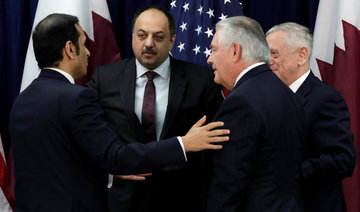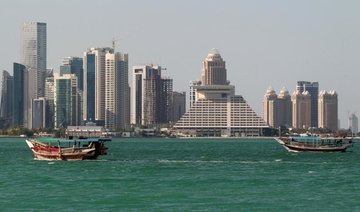The Anti-Terror Quartet Wednesday issued a statement in response to a report of the technical mission of the United Nations High Commissioner for Human Rights, which visited Doha in November 2017, Saudi Arabian state news agency SPA reported.
The statement issued by Saudi Arabia, the UAE, Bahrain and Egypt, follows a visit by the commission to Qatar on Nov. 24, 2017.
The four nations have denounced the report, saying that its findings were based on a limited understanding of the situation.
This is the statement in full:
“Following the report prepared by the Technical Mission of the High Commissioner for Human Rights on its visit to Qatar from 17 to 24 November, 2017, the missions of the Kingdom of Saudi Arabia, the United Arab Emirates, the Kingdom of Bahrain and the Arab Republic of Egypt accredited in Geneva, express their denunciation of the report’s methodological failure, that included a misleading description of the political crisis, leading to the report’s conclusions and observations based on a limited understanding of the general context of the political crisis and its historical background as the basis of this crisis goes back to the background of Qatar’s support for individuals and entities internationally involved in financing terrorism and supporting its activities, and promoting their extremist ideology, which incites violence and promotes hate speech in the Arab region through Qatari media platforms or funded through Qatari figures.
The boycott by the four countries of Qatar is part of the exercise as their sovereign right to protect and defend their national security. It comes as a natural reaction that is not comparable in size and impact to the support by the Government of Qatar of terrorism in flagrant violation of the provisions of the Charter of the United Nations and International Law, and the resolutions by the Human rights Council and the General Assembly relevant to the impact of terrorism on the enjoyment of human rights.
On the other hand, we affirm that these measures are not aimed at the people of Qatar, with whom we have ties of brotherhood, closeness and conciliation, and even a tribal extension to some of our countries.
The missions of the four countries also express their lack of acceptance of the contents of the report and the results reached by it. It contained many allegations and accusations that are unfounded. It also reflects a clear bias toward one of the parties of the political crisis as it adopted the same Qatari story based on false claims that the government of Qatar is seeking to promote regionally and globally.
The missions of the four countries register their reservation regarding the manner and timing of the leaking of the content of the report by the Qatari National Human Rights Committee during its press conference held in Doha, Qatar, on Monday, Jan. 8, 2018. They note that the High Commission did not provide the missions of the four countries with the report until after it was published on Jan. 8, 2018.
They stress that the nature of the technical reports prepared by the High Commissioner for Human Rights at the request of member states aims to transfer experiences to develop the human rights system and address human rights violations in the state itself.
The four countries indicate that it has become clear to them that the main objective of the Qatari government to request a visit by the technical committee of the High Commission of Human Rights comes in the context of the media and political exploitation of the visit and the resulting report, not for its lofty objective of transferring the expertise of the commission to the Qatari side.
The four countries deplored the persistence of the Qatari policies based on lack of credibility and lack of goodwill in their use of the United Nations and its specialized international agencies and international reports.
Accordingly, the four states call upon the High Commission to address the methodological and procedural errors of the report which was not in conformity with international standards and the terms of reference of the High Commission for Human Rights, and which is incompatible with the nature of the work of the technical mission which was sent to Qatar in a manner that does not exceed the geographical boundaries of the state requesting technical support.
The four countries emphasize that the government of Qatar’s disregard for any serious initiatives to resolve the political crisis and its continued attempts to mislead the international community on the main causes of the crisis through the accusations against the four countries at international organizations, despite the considerable and valued efforts of His Highness Sheikh Sabah Al-Ahmad Al-Jaber Al-Sabah, the Emir of Kuwait, confirms the lack of genuine and sincere intention in the foreseeable future in Qatar to return relations to their normal course with the countries of the boycott.”






















